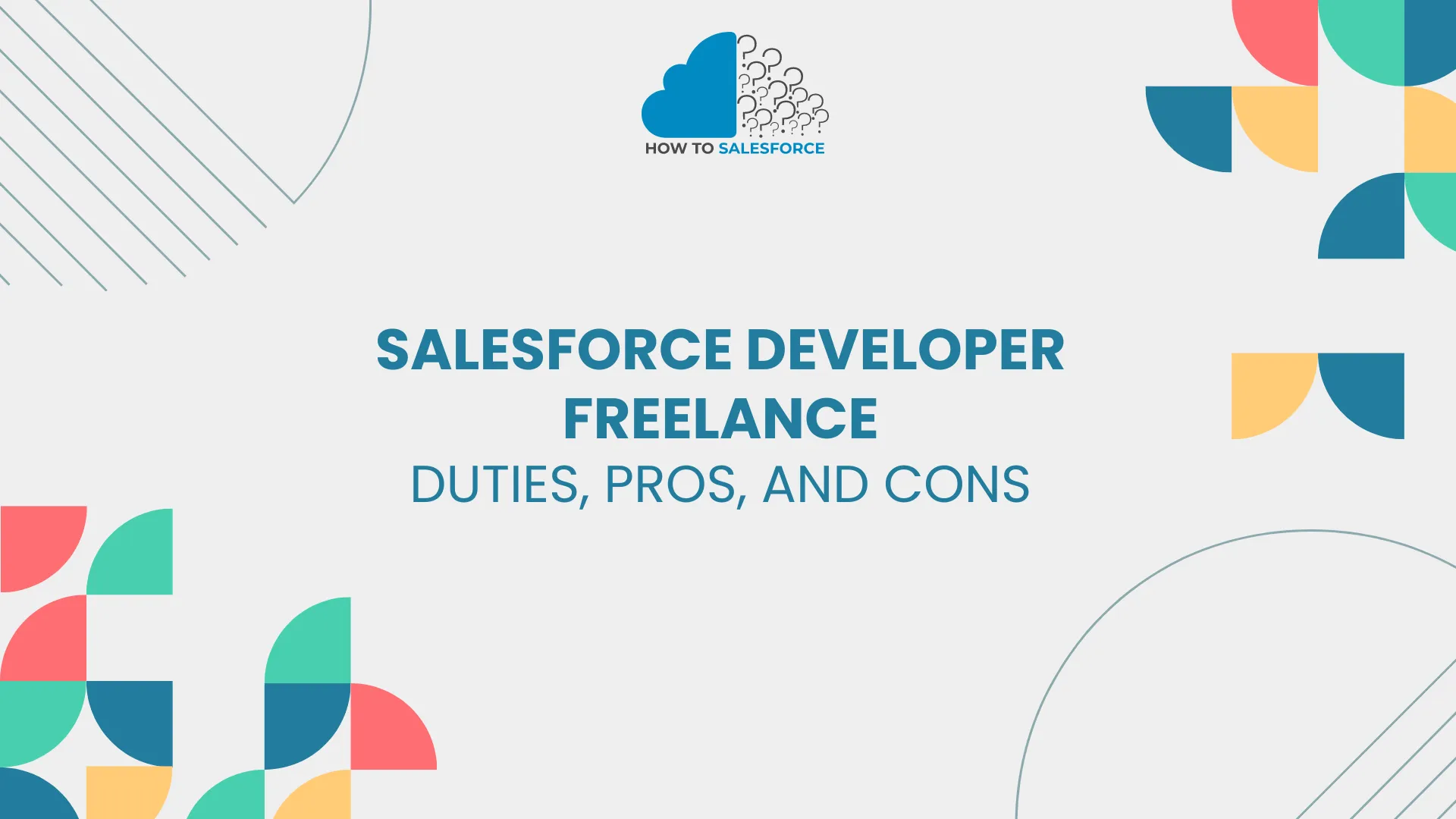Introduction
There are more “freelance Salesforce developer” jobs now because more businesses need custom Salesforce solutions. You can choose your own hours and work with people from different areas when you work as a freelancer. This blog post will talk about what a solo Salesforce engineer does and the pros and cons of the job.
Why Choose Salesforce Developer Freelance Work?
As a freelance Salesforce developer, you can choose the jobs you want to do, set your rates, and work from almost anywhere. Businesses need more skilled workers as they increasingly depend on Salesforce. Such a career is a good way to make money and enjoy your job.
Responsibilities of a Freelance Salesforce Developer
To meet the wants of their clients, “freelance Salesforce developers” do many different tasks. Their duties often combine with those of in-house developers, but they work independently. Here are a few standard things to do:
Making Custom Apps:
- Freelancers use Apex, Visualforce, and Lightning Components to make custom Salesforce applications.
- They change features based on the client’s wants, ensuring that Salesforce works with specific business processes.
System Integrations:
- A lot of the time, freelancers connect Salesforce to other systems, which helps businesses run more smoothly.
- They use Salesforce APIs to connect CRM systems to outside tools for managing data and talking to each other.
User Training and Support:
- Freelancers often train end users so that teams can effectively use the Salesforce tool.
- They provide continuous assistance and tackle any issues or modifications that arise as businesses expand and evolve.
Required Skills for Freelance Salesforce Developers
To be successful as a freelance Salesforce engineer, you need both hard and soft skills. Here are the most important ones:
1. Apex Programming and Visualforce
- Apex is the most essential part of building Salesforce. Freelancers need to learn this language to make their own triggers, routines, and back-end processes.
- Visualforce helps developers make dynamic web pages more accessible for users to connect with and enjoy the site.
2. Salesforce Lightning
- User interfaces are modern and responsive with Salesforce Lightning Components. Lightning-savvy freelancers are sought after for slick, intuitive apps. Read more about Salesforce SFDC Lightning.
3. Problem-Solving and Analytical Skills
As a freelancer, you get to work with different people and solve their unique problems. You need to quickly figure out how to solve these issues if you want to do well.
4. Client Communication
- As freelancers, they need to be able to communicate clearly with clients, understand their business needs, and explain complicated technology ideas.
5. Time Management
- Freelancers have to handle many jobs at once. They meet targets without sacrificing quality because they manage their time well.
Certifications Needed to Succeed as a Freelance Salesforce Developer
Getting a Salesforce license shows that you know what you’re doing and makes you more appealing to possible clients. In a crowded market, freelancers who have certifications can charge more and stand out.
Salesforce Platform Developer I & II:
- These certifications show you how to build for Salesforce in the most critical areas.
- They go over more advanced topics like testing and fixing and the best ways to write good Apex code.
Salesforce App Builder:
- This certification is mostly about making custom apps, and it helps workers learn more about the Salesforce platform.
Architect Certifications in Salesforce:
- Salesforce architects possess advanced degrees and provide solutions for a wide range of clients. These credentials aid freelance architects seeking work.
How to Get Started as a Freelance Salesforce Developer
It might seem hard to become a freelance Salesforce developer, but it’s possible if you take the right steps. To begin, do the following:
1. Build a Portfolio
- Create a Salesforce portfolio before freelancing. Detail your difficulties and solutions.
2. Network within the Salesforce Community
- Join Salesforce Trailblazer, LinkedIn, and online forums. Networking can help you get project referrals from potential clients and other experts.
3. Use Freelancing Platforms
- Upwork, Freelancer, and Fiverr are excellent platforms for finding freelance Salesforce jobs. Create a descriptive profile and bid on relevant tasks.
4. Establish a Niche
- You may attract more clients by specializing in Salesforce integrations or automation. You can also charge premium rates.
5. Set Competitive Rates
- Compare freelance Salesforce developer rates by region and industry. Start at a competitive fee and raise it as you gain experience and clients.
The Benefits of Salesforce Developer Freelance Jobs
As a freelance Salesforce engineer, you can enjoy a number of benefits that make it appealing to workers from all walks of life:
1. Flexibility
- Home office or travel—freelancers can work anywhere. They set their timetables, improving work-life balance.
2. Variety of Projects
- Unlike in-house staff, freelancers work on projects across industries. This variation keeps freelancers engaged and improves their talents.
3. Higher Earning Potential
- Rate-setting freelancers generally earn more than salaried workers. As they develop experience and reputation, they can charge more and handle more complicated assignments.
4. Professional Independence
- Freelancers pick clients and assignments. Being independent from a firm or boss affords them greater creative flexibility.
Challenges of Salesforce Developer Freelance Work
While freelancing offers several perks, it comes with challenges that developers should be aware of:
1. Unpredictable Income
- Freelance jobs fluctuate. Developers may have several projects in certain months and slow others. Effective financial management is essential.
2. Client Management
- Freelancers must manage customer expectations, project deadlines, and miscommunications. Poor customer management causes delays and contract loss.
3. Isolation
- Many freelancers work alone, which can lead to loneliness. This can be overcome by joining co-working places or online development communities.
4. Self-Marketing
- Market your abilities, freelancers. They must spend time creating their web brand and visibility without business support.
Finding Salesforce Developer Freelance Jobs
Freelancers have several ways to find Salesforce developer jobs. Here are the most effective strategies:
1. Freelance Job Boards
- Upwork, Toptal, and Freelancer list Salesforce development jobs. Set up alerts for new projects that match your expertise.
2. Salesforce Events and Conferences
- Attend Salesforce events like Dreamforce to meet clients. It is excellent to meet firms that need bespoke Salesforce solutions at these events.
3. LinkedIn Networking
- Promote your certificates, projects, and testimonials on LinkedIn. Subscribe to Salesforce groups where clients submit freelancing jobs.
4. Referrals from Past Clients
- Word-of-mouth marketing is powerful in freelancing. High-quality work and good client connections typically lead to referrals and repeat business.
Pricing Your Services as a Salesforce Developer Freelancer
Setting the right price for your services is one of the hardest things about being a freelancer. For price, here are some things to think about:
1. Experience Level
- Veteran Salesforce developers might charge more. Start by researching entry-level developer prices and adapt as you learn.
2. Project Complexity
- More sophisticated projects require more significant fees. Advanced integrations, unique apps, and high-level security warrant a premium charge.
3. Industry Demand
- Due to stricter rules and security standards, finance and healthcare may pay more for Salesforce development.
4. Location
- Rates depend on location. Developers in high-cost locations can charge more, but freelancers in low-cost regions can compete globally.
Transitioning to Full-Time Freelance Salesforce Developer Work
If you are already working full-time in Salesforce, you need to carefully plan your move to solo work. To make an easy change, do the following:
1. Start Freelancing on the Side
- Before quitting your full-time employment, do some freelancing work. This will boost your clientele and reputation.
2. Financial Planning
- Before freelancing full-time, save six months. A financial cushion is vital for freelancers during quiet periods.
3. Set up a Business Structure
- Depending on your location and business goals, you can form an LLC or a single proprietorship. This helps you separate personal and corporate finances for tax benefits.
4. Invest in Tools
- Buy the correct freelance tools. Project management, accounting, and communication systems streamline project delivery and client interaction.
Conclusion
Freelancing as a Salesforce developer offers unmatched freedom, creativity, and fascinating assignments across sectors. Freelancing is difficult, but planning, learning, and networking can help you succeed. You may achieve your goals as a freelance Salesforce developer by improving your abilities, generating a portfolio, and selling yourself.


